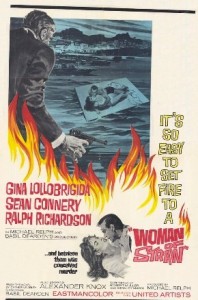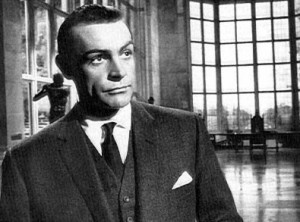 One last film—and a little examination of Woman of Straw. My apologies if I possibly misappropriate “little” here as Brahms misused “tiny, tiny” in referring to his four-movement, fifty-two-minute Second Piano Concerto! The “composer” of the score for Woman of Straw is listed as Norman Percival. If there is any of Percival’s music in the film, I don’t recall it, for there is no true soundtrack, only source music—the orchestra heard from the open reel recordings of rich, arrogant and ill Charles Richmond (Ralph Richardson), an invalid who happens to be a music lover.
One last film—and a little examination of Woman of Straw. My apologies if I possibly misappropriate “little” here as Brahms misused “tiny, tiny” in referring to his four-movement, fifty-two-minute Second Piano Concerto! The “composer” of the score for Woman of Straw is listed as Norman Percival. If there is any of Percival’s music in the film, I don’t recall it, for there is no true soundtrack, only source music—the orchestra heard from the open reel recordings of rich, arrogant and ill Charles Richmond (Ralph Richardson), an invalid who happens to be a music lover.
The main title is the opening of Beethoven’s Ninth, with that tremolo hum of repeated sixteenth notes. The Beethoven continues into the first scene at Richmond’s country estate of Foxhurst, as he adjusts the volume of the Ninth on his house intercom system and then moves outside in his wheelchair. Arriving at the mansion is his nephew Tony (Sean Connery). The Beethoven fades as Charles shouts for his dogs to jump over his cane.
That evening, Tony and his uncle play chess while the first movement of Berlioz’ Symphonie fantastique plays on an open reel machine, state-of-the-art reproduction at the time. “Underrated Berlioz,” Charles pronounces. “Warm man of true passion.”
Charles’ new nurse, Maria Marcello (Gina Lollobrigida), arrives. Standing outside the door, she is at first a dark silhouette, which might be interpreted a number of ways, perhaps not too deeply for this is, generally, a muddled script. After immediately ridiculing her as a foreigner and asking, “You wash regularly?,” the next day he seems to soften, offering her a valuable ring, which she refuses. From the tape player comes Mozart’s Cosi fan tutte Overture.
Aboard his yacht, preparing for sea, Charles and Maria listen to Beethoven’s Eighth Symphony (second movement). “They thought of him,” he says, “as a bore—Beethoven, a gross, clumsy oaf, no sense of humor, no social graces, kept him at arm’s length.” (Beethoven, no humor?!) At dinner, with the Berlioz playing again (now the third movement), Charles throws a tantrum, tossing the guests’ chicken dinners against the wall and insisting fish be served.
During a storm, when a man almost drowns, Maria observes the gleeful look on his face and, refusing to nurse such a monster, as she calls him, she leaves the yacht at the next port of call. There, in a hotel, she waits for him to come to her—a bit incongruous, if, after all, he’s such a monster! Behind this is the gorgeous Andante from Rimsky-Korsakov’s Capriccio Espagnol. Reluctantly, Charles goes to her—and proposes marriage, which also seems a little implausible. After their wedding, her role as a doting wife seems sincere. He plays the end of the Beethoven Leonore Overture No. 3 and then part of his opera Fidelio. “The story of a devoted wife,” he tells her.
The next morning she enters his cabin to find him dead in bed, and when she tries to ring for help, the electric bell cord doesn’t work. She awakens Tony and he suggests, that since no one else knows he is dead, they “pretend” he’s alive, long enough to have his will registered—for “all that money.” (It’s vague as to what earlier agreement was made between Maria and Tony; when they are alone together, there is no suggestion of collusion.)
 They sit Charles up in his wheelchair, adding a hat, dark glasses and a scarf wrapped high around his chin. Tony turns on the tape machine—the first movement of Beethoven’s Ninth again—and reminds her, “He’s alive, Maria, he’s alive!” For the benefit of others, as the dead man is transferred from the yacht and during the car ride to Foxhurst, she reminds Charles not to speak, to save his voice, now that he is . . . “ill.”
They sit Charles up in his wheelchair, adding a hat, dark glasses and a scarf wrapped high around his chin. Tony turns on the tape machine—the first movement of Beethoven’s Ninth again—and reminds her, “He’s alive, Maria, he’s alive!” For the benefit of others, as the dead man is transferred from the yacht and during the car ride to Foxhurst, she reminds Charles not to speak, to save his voice, now that he is . . . “ill.”
As the limousine arrives at the mansion, Berlioz’ Symphonie Fantastique (third movement again) is heard from the soundtrack—a slip, one of only two times when classical music isn’t used as source music from one of Charles’ tape players, the other being the Rimsky-Korsakov. Maria remains sequestered in the bedroom, the door locked, with the body still sitting upright in the wheelchair, the butler even bringing their supper on a cart. (Another stretch of credibility! Don’t the captain of the yacht, the chauffeur, the butler, the servants ever wonder why Charles never moves his head or arms, or why such an independent man would obey anyone’s order to remain silent? Alert viewers might wonder as well how, on a dead body, the head can remain erect, and, after these few days, not emit some sort of, er, fragrance!)
In admitting to the room a man she assumes to be the accomplice doctor Tony is to send, she mistakenly admits Detective Inspector Lomer (Alexander Knox), who is immediately suspicious. Maria is surprised to learn that her husband died from barbiturate poisoning, and when Tony comes to her cell, she accuses him of double-crossing her from the beginning. He sneeringly admits it.
In the dénouement, Tony arrives at Foxhurst, settles behind his uncle’s desk and lights one of the dead man’s cigars, leaning back in the chair and surveying the magnificent house around him—all his at last. From the wall speaker, there comes the Leonore Overture No. 3.
He rushes upstairs to Charles’ bedroom. Inspector Lomer is working the tape machine. “There’s a new witness,” he announces. Tony disdains that it could be Thomas, one of the servants. “Not Thomas—your uncle.” He plays a tape, now with Charles’ voice: “Can’t make anyone hear. You’ve cut the bell. See your game, right through. Think I can’t get anyone, tell anyone. I’ll record . . . record. Oh, God! Feel it coming over me—the poison. You’ve . . . poisoned me. I—record it.”
Soon caught in a lie, Tony bolts from the room. He passes near Thomas, who is wheeling away Charles’ chair. As Tony reaches the top of the long staircase, the servant shoves the wheelchair forward, Tony trips and tumbles down the stairs to his death. Maria returns. Now it is she who is admiring the fine house, to the accompaniment of—yes, the bustling coda of the Leonore Overture, the only part ever played.
Rather late to be saying so—undoubtedly this summary has more than suggested it—but Woman of Straw isn’t a great movie, probably, by most judgments, not even a good one. Its main flaw lies in its half-baked plot. Is Maria’s “love” for the old man genuine? At times that seems to be the case; at others, from certain close-ups, it seems otherwise. Exactly what is Maria’s relationship with Tony? And when did it begin? It seems, from what she says to him in her prison cell, and from his reaction, that the scheme to grab Charles’ money was planned from their first meeting. Yet she seems sincerely surprised when she finds her husband dead, more surprised that he was murdered. Maybe the two had agreed to wait until the old man died of natural causes. Who knows?!
Who cares. The music is great!